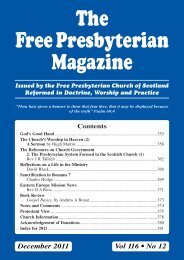March - the Free Presbyterian church of Scotland
March - the Free Presbyterian church of Scotland
March - the Free Presbyterian church of Scotland
You also want an ePaper? Increase the reach of your titles
YUMPU automatically turns print PDFs into web optimized ePapers that Google loves.
68The <strong>Free</strong> <strong>Presbyterian</strong> MagazineKeeping Alive <strong>the</strong> Love <strong>of</strong> God 1A Sermon by Archibald AlexanderJude 21. Keep yourselves in <strong>the</strong> love <strong>of</strong> God.he phrase love <strong>of</strong> God has two meanings in <strong>the</strong> New Testament. First, itTmeans God’s love to us; second, our love to God.In <strong>the</strong> first sense it is used in such passages as <strong>the</strong> following: “The love <strong>of</strong>God is shed abroad in your hearts, by <strong>the</strong> Holy Ghost which is given untous” (Rom 5:5); “Nor any o<strong>the</strong>r creature shall be able to separate us from <strong>the</strong>love <strong>of</strong> God, which is in Christ Jesus” (Rom 8:39); “After that <strong>the</strong> kindnessand love <strong>of</strong> God our Saviour to man appeared” (Titus 3:5); “Hereby perceivewe <strong>the</strong> love <strong>of</strong> God, because He laid down His life for us” (1 Jn 3:16); “Inthis was manifested <strong>the</strong> love <strong>of</strong> God toward us” (1 Jn 4:9).It is used in <strong>the</strong> second sense in: “Ye . . . pass over judgement and <strong>the</strong> love<strong>of</strong> God” (Lk 11:42); “I know you, that ye have not <strong>the</strong> love <strong>of</strong> God in you”(Jn 5:42); “The Lord direct your hearts into <strong>the</strong> love <strong>of</strong> God” (2 Th 3:5); “InHim, verily is <strong>the</strong> love <strong>of</strong> God perfected” (1 Jn 2:5); “But whoso hath thisworld’s good, and seeth his bro<strong>the</strong>r have need, and shutteth up his bowels<strong>of</strong> compassion from him, how dwelleth <strong>the</strong> love <strong>of</strong> God in him?” (1 Jn 3:17);“For this is <strong>the</strong> love <strong>of</strong> God, that we keep His commandments” (1 Jn 5:3).To which may be added <strong>the</strong> words <strong>of</strong> our text: “Keep yourselves in <strong>the</strong> love<strong>of</strong> God.”Such exhortations do not imply, as some teach, that those addressed possessin <strong>the</strong>mselves a complete ability to perform what is commanded, withoutdivine aid. The maxim that, where <strong>the</strong>re is a command, <strong>the</strong>re is always abilityto obey, is false. The obligation to obedience may remain when <strong>the</strong> ability islost, as is <strong>the</strong> case with every sinner. The maxim holds good in relation to allcreatures as <strong>the</strong>y proceed from <strong>the</strong> hands <strong>of</strong> God. But who would deny that <strong>the</strong>devil is under obligation to love his Creator; and yet who would affirm tha<strong>the</strong> has <strong>the</strong> ability to change his nature from enmity to love? Human agencyand divine agency are not at war but in harmony. God commands what isright and graciously gives strength to perform it. It is analogous to what weobserve in natural things. It is <strong>the</strong> duty <strong>of</strong> <strong>the</strong> husbandman to plough and sowand water, but without <strong>the</strong> sun, air and rain he cannot have a crop. God mustgive <strong>the</strong> increase.The true principle is taught by Paul: “Work out your own salvation withfear and trembling, for it is God which worketh in you both to will and to do<strong>of</strong> His good pleasure” (Phil 2:12,13). Our dependence on God is no reasonwhy we should sit still and be idle, but it is a good reason for being up1 Taken, with editing, from Alexander’s Practical Sermons.
















